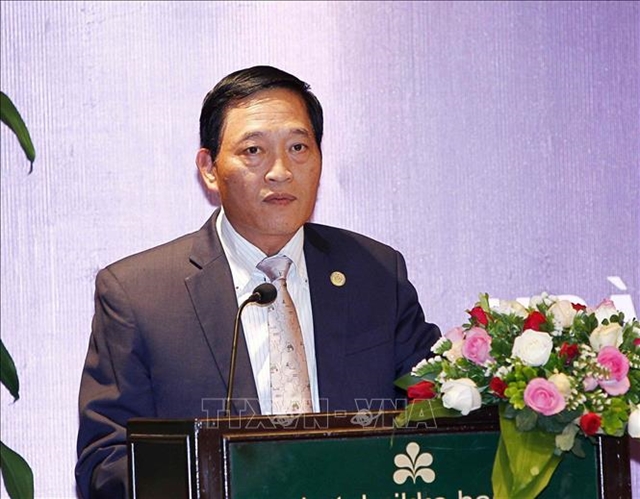.jfif) Opinion
Opinion


|
| Trần Văn Tùng, Deputy Minister of Science and Technology. — VNA/VNS Photo |
Trần Văn Tùng, Deputy Minister of Science and Technology, talks to Vietnam News Agency on his ministry’s contributions to national industrialisation and international integration
How did the Ministry of Science and Technology contribute to industrialisation and international integration in 2019?
One of the major tasks the ministry has been assigned by the Government is to offer the best services to accomplish national targets in the fields of production, national defence, science and technology, particularly in biotechnology, petrochemicals, material, energy, automation, nano and some others.
Last year, the ministry pooled all its efforts to carry out the tasks assigned by the Government to help raise national economic development.
At the same time, the ministry has cut many business conditions for enterprises and acted as a focal point in implementing the Prime Minister’s Instruction No.16 on the 4th Industrial Revolution.
In 2019, the ministry carried out measures to accelerate the development of the entrepreneurial ecosystem.
Meanwhile, the ministry also worked with other ministries and sectors to speed up the national socio-economic programme. For example, work was carried out in studying, designing, manufacturing and successfully launching the Micro Dragon satellite of Việt Nam. It also contributed to improving the capacity of natural disaster forecasting and prevention as well as climate change adaptation to relevant agencies.
The ministry actively implemented scientific and technological programmes for the national target project on building new-style rural areas and the One Commune-One Product programme to develop agricultural products.
Other activities included scientific and technological research to build technical standards for products and prevent trade fraud, and supporting businesses in researching and mastering advanced technologies and equipment and manufacturing high-value products.
Many scientific and technology programmes were carried out, focusing on developing key products and promoting innovative start-up.
Difficulties remain for the sector in affirming its role and position in the country’s development process.
What are the ministry’s solutions in the future?
The science and technology sector has made huge contribution to the country’s socio-economic development. In the context of the fourth industrial revolution, the sector has mapped out solutions to become a motivation for the country’s rapid and sustainable development in the future.
In the year 2020 and beyond, the ministry will focus on implementing key programmes and master plans to promote demand for technology and innovation from businesses, encouraging businesses to invest in setting up funds on science and technology, establishing research institutes and science and technology enterprises, and enhancing public-private partnership in implementing large-scale technological projects.
The ministry will also work to further complete its legal corridor to promote the development of science and technology. In addition, we also hope to accomplish the revision of the Law on Intellectual Property Rights for the National Assembly to consider and approve in 2021.
The ministry will continue this year to renew its management tasks on science, technology and creativity while working on the development of more management staff in science and technology.
Last but not least, in 2020 Việt Nam will play the role as the ASEAN Chairman and a non-permanent member of the UN Security Council for the term 2020-2021. This is an occasion for Việt Nam to push up its research co-operation to tap into resources and knowledge within advanced countries while gradually raising its research capacity. It is also important to draw the strengths of Vietnamese scientists abroad.
The ministry will continue renewing to further developing the science and technology sector, making greater and more practical contribution to the rapid and sustainable development of the country. — VNS




